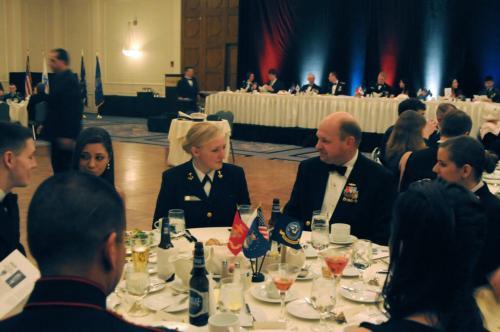
News
Harvard Quietly Resolves Anti-Palestinian Discrimination Complaint With Ed. Department

News
Following Dining Hall Crowds, Harvard College Won’t Say Whether It Tracked Wintersession Move-Ins

News
Harvard Outsources Program to Identify Descendants of Those Enslaved by University Affiliates, Lays Off Internal Staff

News
Harvard Medical School Cancels Class Session With Gazan Patients, Calling It One-Sided

News
Garber Privately Tells Faculty That Harvard Must Rethink Messaging After GOP Victory
Will ROTC Return?
Years after program's banishment from Harvard, debate over ROTC's future continues

Joseph M. Kristol ’09, a Marine officer-in-training, does not find it easy to appear on campus in his uniform.
“It’s kind of an uncomfortable feeling,” he said, “because this is not something the University recognizes or supports.”
Kristol and other Harvard members of the Reserve Officers’ Training Corps (ROTC) do not anticipate it getting any easier as the University continues to refuse to officially acknowledge the military program.
“It is unlikely that there will be changes at this time,” a Harvard spokesman wrote in an e-mail.
Removed from Harvard’s campus in 1970, the University has prevented ROTC from returning in recent years because of the military’s “Don’t Ask, Don’t Tell” policy, which prohibits openly homosexual or bisexual Americans from participating in the armed forces.
The question for Harvard—which supplies 29 students to the Army, Navy, and Marines ROTC—is whether the University does enough to support its would-be officers in an endeavor that, if seen through to the end, poses stakes higher than any classroom ever could.
Harvard’s policy on ROTC came to the center of recent partisan debate on campus this semester, when the Harvard Republican Club (HRC) approached the Harvard Democrats, with a proposal aimed at addressing “areas in which Harvard falls short of providing an environment of respect and encouragement of [its ROTC cadets’] service.”
The proposal’s seven original points were vetted down to four, with two recommendations—one to allow recognition of ROTC coursework on the Harvard transcript, another to encourage a faculty resolution to bring ROTC back on campus upon the repeal of the “Don’t Ask, Don’t Tell”—narrowly passing in an open vote, according to Harvard Democrats President Jarret A. Zafran ’09.
Two other recommendations, one seeking to soften the language with which ROTC is presented in the student handbook, and another to allow official ROTC color guards at more Harvard events did not pass.
The sticking point in all the votes, Zafran said, was “Don’t Ask, Don’t Tell,” which the College Democrats view as a discriminatory policy that precludes their support for the ROTC program.
According to Kyle A. Krahel ’08, a former Harvard Democrats legislative director and noted campus activist, the HRC’s recommendations are a “chipping away of the separation between the University’s nondiscrimination policy and a discriminatory organization.”
“You can wave the flag here and push it a little bit, you can say ‘just put this on people’s transcripts. What are you not patriotic? Do you not want to make life a little better for these people?’” Krahel said. “And that argument never stops, the next thing they’re back on campus and they have a barracks.”
HRC President Caleb L. Weatherl ’10, who has been leading the recent proposal, is reluctant to comment on the issue for fear of harming the negotiations which he said are ongoing with the Dems.
“We’re still hopeful that we’re going to be able to put together a bipartisan compromise,” Weatherl said, pausing for a moment to choose his words.
“But the process isn’t moving along quite as quickly as we had hoped it might.”
A CHANGE AHEAD?
But if a Democrat is elected president, there could be a change in the military’s policy, said Government professor Harvey C. Mansfield ’53.
“That would remove the main obstacle in Harvard’s case,” Mansfield said.
Even supporters of ROTC said that physically reinstating the program at Harvard may not be possible. Given the small number of students participating in ROTC, per-student costs of the program’s infrastructure could be prohibitive.
Instead, the changes that Kristol, Harvard ROTC Association president, said he hopes the University will make are mostly symbolic—rewording the description of ROTC in the student handbook, which calls the program “inconsistent with Harvard’s values,” and paying for cross-registration at MIT.
“It’s mainly the standing, the recognition,” said Kristol. “It’s an intangible thing that we agree you exist, we support what your decision is.”
Leaders of the Harvard Republican Club said they also hope to engage University administrators in the course of a campaign to improve ROTC’s status on campus.
“The Faculty has tended to take up this issue at different times, and it has been contentious,” Republican Club officer Colin J. Motley ’10 said. “We think that the Faculty are a little bit out of touch with student opinion.”
Students in ROTC said that they appreciated support from former University President Lawrence H. Summers, who attended the commissioning ceremonies for graduating seniors during his term in office.
“That was really meaningful to the cadets and midshipmen who are becoming officers,” said Kristol, “since commissioning can be more important than graduation.”
Summers’ successor Drew G. Faust, who took office this fall, was not present at the commissioning last summer. She did have an ROTC color guard participate in her installation ceremony.
After this gesture, Motley said that he hopes for more productive dialogue on the future of ROTC.
“We think it’s an issue that has been overlooked, and we’d like to bring it back into focus.”
—Clifford M. Marks contributed to the reporting of this story.
—Staff writer Christian B. Flow can be reached at cflow@fas.harvard.edu.
—Staff writer Athena Y. Jiang can be reached at ajiang@fas.harvard.edu.
—Staff writer Rachel A. Stark can reached at rstark@fas.harvard.edu.
For comprehensive coverage of the Iraq War's impact at Harvard five years later, check out The Crimson's
Iraq Supplement.
Want to keep up with breaking news? Subscribe to our email newsletter.
